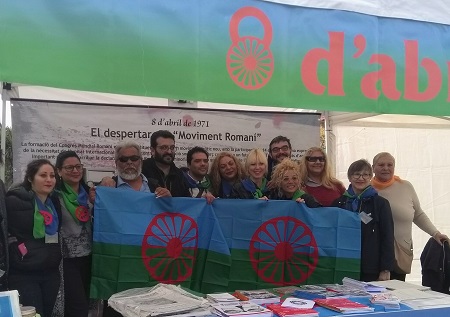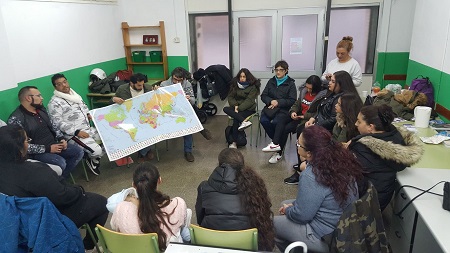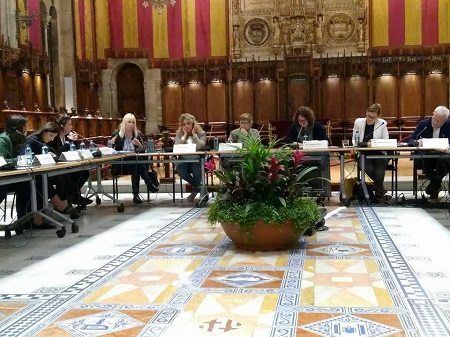A study recommends integrating Roma models in teaching and to analyse the underlying reasons for school failure among this community
A study recommends integrating Roma models in teaching and to analyse the underlying reasons for school failure among this community
The project "Vakeripen", drefted by GRITIM-UPF, in collaboration with Rromane Siklǒvne association and Pere Closa Private Foundation, has been based on workshops and dialogue sessions with families and teachers from different residential areas in the metropolitan area of Barcelona considered marginal.

The main goal of the project “Vakeripen” (“conversation”, in Roma language) that combines qualitative research and social work, is to improve both practical aspects and knowledge about the construction of sustainable working models against exclusion, school failure and dropping out of studies among the Roma community. It is co-funded by the European Union, within the “Rights, Equality and Citizenship” programme.
Zenia Hellgren, GRITIM-UPF researcher, presented the results of the project “Vakeripen. Roma inclusion in education: fostering constructive attitudes and good practices in the Barcelona area” on 15 May 2018, in the framework of the meeting on the inclusion of Roma people organized by Barcelona City Council. This meeting is part of the EUROCITIES working group which involves the Interdisciplinary Research Group in Immigration (GRITIM-UPF), of the Department of Political and Social Sciences.
Some of the main preliminary conclusions arising from the project, which has been carried out by GRITIM-UPF since January 2017 and is to continue until July 2018, are the following: both Roma families and school staff encounter structural limitations that affect the relationships between them; Roma families do not have low expectations regarding their children’s education, and the boys and girls of this group lack Roma models in the society in which they live.
 The study was drafted by the researchers Zenia Hellgren, along with Lorenzo Gabrielli, Evren Yalaz and Dirk Gebhard, of GRITIM-UPF, in collaboration with project partners Pedro Casermeiro, of the Rromane Siklǒvne cultural association, and Miguel Ángel Franconetti, of the Pere Closa Private Foundation. It was carried out in four residential areas in the metropolitan area of Barcelona considered marginal: Bon Pastor, La Mina, Sant Roc and El Gornal.
The study was drafted by the researchers Zenia Hellgren, along with Lorenzo Gabrielli, Evren Yalaz and Dirk Gebhard, of GRITIM-UPF, in collaboration with project partners Pedro Casermeiro, of the Rromane Siklǒvne cultural association, and Miguel Ángel Franconetti, of the Pere Closa Private Foundation. It was carried out in four residential areas in the metropolitan area of Barcelona considered marginal: Bon Pastor, La Mina, Sant Roc and El Gornal.
The research was based on a large number of workshops and dialogue sessions with families and teachers in these areas, complemented by in-depth interviews with Roma parents (a total of sixty families have taken part), teachers and intermediary players, school mediators and social integrators. It included the observation of the participants and the training of the teachers, organized by the project team.
“There is a need for a broader vision on school failure”
One of the main conclusions of the study, whose final report will be published in August 2018, is that “it is necessary to know the underlying reasons for which a Roma boy or girl does not go to class because what the school might perceive as a lack of interest or involvement, may reflect a living situation that is difficult to sustain”, says Zenia Hellgren, who stresses the need to work on multiple levels.
On the one hand, on a structural level, we must improve the economic and employment prospects and social mobility in these areas, review the role of the social services, so that the teachers can focus on teaching. On the other, on an interpersonal level, at school we must work with awareness, understanding and flexibility to find viable channels for communication.
Some of the structural constraints that both the Roma families and school personnel may encounter, and which may affect the relationships between them, are related to the fact that many Roma parents are affected by financial and job insecurity and frequently suffer discrimination. This generates frustration and fear that their children will be discriminated against by school staff and others.
In addition, the school staff has to deal with a constant lack of resources: time and budget deficits mean that teachers cannot attend to or focus sufficiently on the educational needs of their students and have to perform “social work” (some students come to class without their basic needs being covered, even hungry, and sometimes they have to provide them with sandwiches, for example).
“Roma families do not have low expectations regarding their children’s education”
 “Roma families want their children to continue studying and to have a better life than theirs. However, they are highly aware that the lack of financial resources may hinder them, for example, paying university fees”, says the GRITIM-UPF researcher.
“Roma families want their children to continue studying and to have a better life than theirs. However, they are highly aware that the lack of financial resources may hinder them, for example, paying university fees”, says the GRITIM-UPF researcher.
Thus, it is worth highlighting that the individual attitude of each teacher and their level of involvement are essential to support and motivate the students. “It is crucial that the teachers in the schools of these neighbourhoods really want to work in the place where they are, that they believe in their students and that they are able to convey these positive expectations”, says Zenia Hellgren, who stresses that the families’ expectations should be realistic.
To make all of this possible, schools need to improve and develop support structures and information about future prospects, especially regarding secondary education: for example mentoring programmes and detailed information, including existing scholarships or the path that must be followed to end up working in different professions.
“There is a lack of Roma models in society”
One of the conclusions of the study is that there is a need to give visibility to Roma culture and history on the general syllabus, not only in schools with a high proportion of Roma students. For example, by including Roma authors and artists in a standard way in Spanish and Catalan literature classes; talking about the gypsy victims of the holocaust, and also working to recruit Roma teachers and other models, not only as mediators.
“Roma children in these neighbourhoods rarely know any adults with whom they can identify that have pursued higher education and have a stable job. There aren’t any gypsy teachers in schools, and gypsy culture and history are rarely explained in class. The boys and girls and their families hardly ever see a positive image of their own culture or of people of Roma origin transmitted by the majority society. This model should be changed”, concludes Zenia Hellgren.
